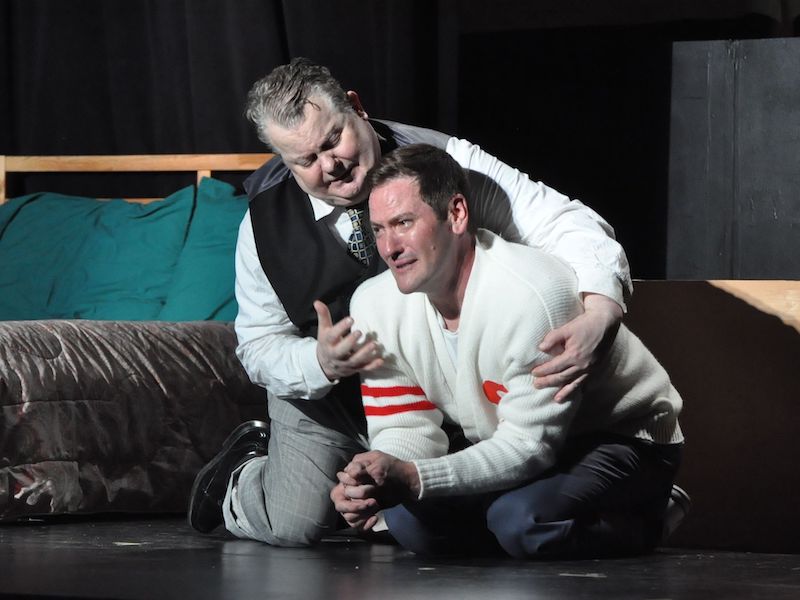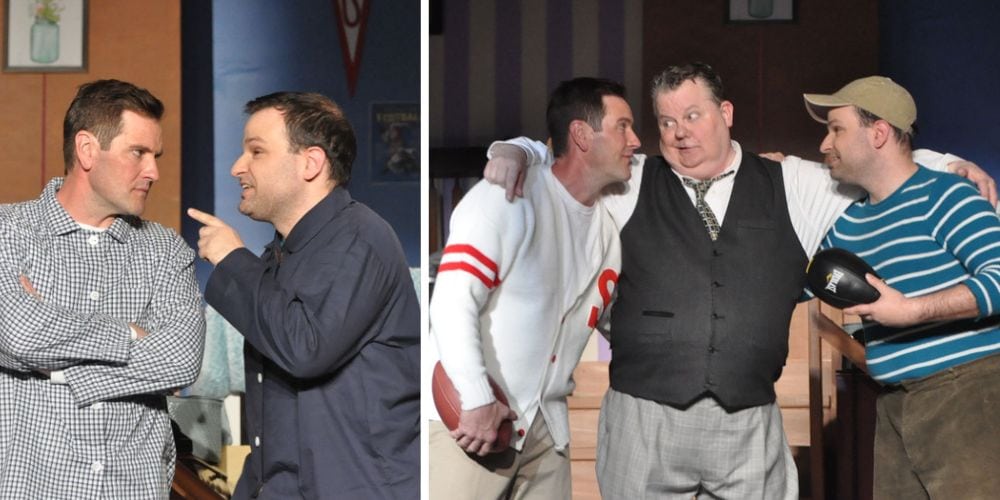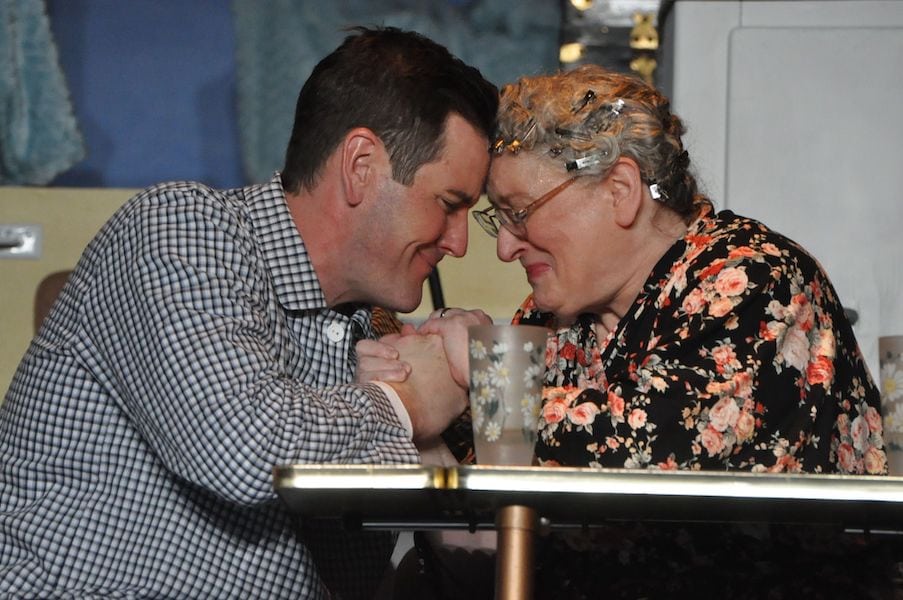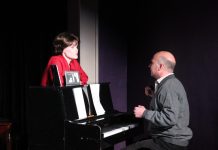No matter how advanced we are as a society, and how technical our jobs and processes become, our basic human desires to be loved, respected, and appreciated continue to be the driving forces of our daily lives. American playwright Arthur Miller’s Death of a Salesman is one of those works that continue to be relevant, more than 70 years after it was written, because of the story’s themes and conflicts surrounding those fundamental needs.
Vienna Theatre Company has taken on Miller’s classic mammoth of human emotion at Vienna’s Community Center. Death of a Salesman is centered on the proud and stubborn Willy Loman as he tries to come to grips with the man he has become and the legacy he has created for his family. Set in the 1940s, the play touches on the damaging nature of toxic masculinity and a society where mediocrity amounts to failure.

Rosemary Hartman directed the production with an efficiency of space, with the help of an impressive set design by George Farnsworth. Most of the play takes place in the Lomans’ home, which is depicted as a split-level residence with multiple bedrooms.
Loman (Tom Flatt) presents himself as an enormously successful traveling salesman, but in fact he has become too tired for the road and cannot afford his bills. His young boss, Howard (Reece Smyth), is unsympathetic to Loman’s grand ideas of the company owing him anything for his years of service, but Loman continues to boast of his position.
Flatt does a good job displaying Loman’s irrational take on reality, with the pompous bark of a powerful man, contrasting the moments of desperation, muttering to himself, and yelling at shadows from his past.
Loman’s sons, Biff and Happy, played by Patrick Killoran and Michael Angeloni respectively, are a source of heartache and frustration for the washed-up salesman. Despite their good looks and athletic ability, any promising future the young men had was squandered, and Loman, plagued with memories of altercations and disappointments that seep into his reality, struggles to understand why.
Biff and Loman have an especially contemptuous relationship that is the main focus of the play. Killoran as Biff shows a son conflicted by his love for his father and the resentment that has built after years of disappointment and dishonesty from the man he admired above all else.

Steve Rosenthal is Charlie, Loman’s neighbor and frenemy of sorts. The two men have a friendly banter that skirts hostility. Charlie’s kindness and generosity have kept Loman out of complete ruin, but he has never been able to convince Loman to take a steady job working for him close to home, with no travel. Another example of Loman’s crippling pride and inability to accept the reality of his position.
Perhaps the most tragic character is Linda Loman, played by Gayle Nichols-Grimes. The wife and mother battles to keep her family together but is an enabler to her husband’s delusions and defends his honor to the detriment of her children. Willy is not a good husband and disrespects Linda constantly. But the patriarchal poison of the times, which burns in Willy, blinds Linda to any option outside of staunchly supporting her husband.

Loman is not an honorable man. But he is not a villain. He is haunted by the success of others around him and has been slowly slipping into insanity, laying his disappointment in himself on his sons — refusing to acknowledge his own failure as a father, husband, and role model and ultimately trapping himself with his own delusions of grandeur, which offer him no way out.
Death of a Salesman is a tragic story of a crumbling family, built on a series of false promises, fantastical expectations, and unsupported self-importance. Willy Loman is arrogant and far from blameless, but he is also the victim of a toxic idealism that permeates society still today, pushing people to always need to be the best, the fastest, the richest. Success equals happiness and there is no gray area to be content. This struggle to achieve above everything else ultimately drives Loman to his grave.
Vienna Theatre Company has created a solid production of Arthur Miller’s classic. There are moments with scene change lags that take some of the energy down but the cast is strong and the material prevails.
Death of a Salesman is not a feel-good play. But often a dose of reality, and the damage denial can create, is a necessary reminder to maintain perspective. Appreciate life for the value it holds in every moment, instead of materials. Cherish the love of friends and family, over the admiration of strangers. Accept the kindness of others as a sign of their goodness, instead of one’s own weakness. Worthy lessons still today.
Running Time: Approximately two hours 40 minutes, with one 10-minute intermission.
Death of a Salesman plays through May 8, 2022, presented by Vienna Theatre Company performing at the Vienna Community Center, 120 Cherry Street SE, Vienna, VA. To purchase tickets ($15), go online.
The Sunday, May 8 matinee performance will be an ASL event. To request reserved seating with an unencumbered view of the interpreters, email Lily Widman or call 703-255-5738.
CAST
Willy Loman (Tom Flatt), Linda (Gayle Nichols-Grimes), Biff (Patrick Killoran), Happy (Michael Angeloni), Bernard (Ric Andersen), The Woman (Erin Gallalee), Charley (Steve Rosenthal), Uncle Ben (Eric Storck), Howard Wagner (Reece Smyth), Jenny/Letta (Amanda Ellis), Stanley (Paul Smith), Miss Forsythe (Nicole Koluder)
PRODUCTION TEAM
Director- Rosemary Hartman, Producer- Eric Storck, Stage Manager- Katie Boone, Assistant Stage Managers- Peter Storck/Charlie Boone, Lighting Designer- Ari Mcsherry, Sound Designer/Projections- Jon Roberts, Properties Designer/Set Dressing- Jocelyn Steiner, Costume Designer- Farrell Hartigan/Juliana Cofrancesco, Stage Combat- Steve Lada, Make-up Design- Joan Zeigler, Assistant Props/Set Dressing- Bunny Bonnes, Set Construction- George Fransworth, Assistant Set Construction- Bill Glikbarg/Fred Royer/Patrick Killoran, Program Designer- Mary Ann Hall, Graphic Designer- Turner Bridgforth, Photographers- Matthew Randall and Jeff Storck




